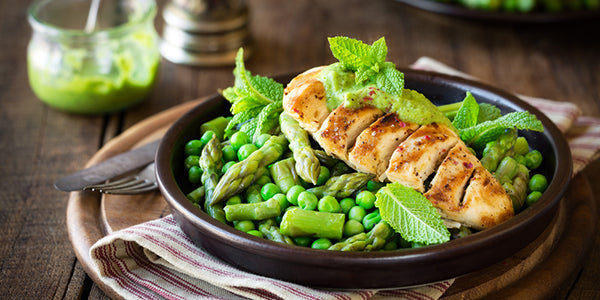
Protein Health Benefits
Along with fat and carbohydrates, protein is one of the three macronutrients, which essentially means the body needs relatively large amounts of it. Each macronutrient lends momentous functions and benefits to the body, including the following that are specific to protein:
1. Builds and Repairs Body Structures
Protein is an important component of virtually every cell in the body, along with acting as the primary building block of bones, muscles, cartilage, skin, and blood.
Protein is also required to make enzymes, hormones, and other body chemicals.
2. Supports A Healthy Metabolism
Protein supports a healthy metabolism in a number of fashions, including by providing of B vitamins and stimulating muscle growth:
• B Vitamins
The majority of lean proteins are rich in B vitamins. While each of the eight essential B vitamins has their own set of functions, they cohesively provide the body with energy and helps metabolic processes function at their prime.
• Muscle Growth
In conjunction with resistance and strength training, protein is critical to repair, grow, and sculpt muscle mass. And the more muscle one has, the faster their metabolism.
3. Encourages Weight Loss and Maintenance
First off, sporting greater muscle mass lends a faster metabolism, thus facilitating a greater calorie burn even when the body is at rest.
Furthermore, high-quality proteins tend to be more satiating than carbohydrates or fats. So in addition to a faster metabolism, which lowers the risk of overeating.
4. Improves Overall Health
Maintaining a healthy weight lessens the risk of a multitude of chronic diseases, while controlling the fat content can lower the risk of heart disease.
Furthermore, preserving muscle, bone, and contributes to not only a healthier life, but a longer one.
How Much Protein Do You Need?
To reap the benefits of protein, it is imperative to consume an appropriate intake. While there are a number of factors that influence protein needs, including age and activity levels, the Recommended Daily Allowance (RDA) for women and men is 45 and 56 grams a day, respectively.
Along with consuming enough, it is likewise important to consume protein from high-quality and lean sources, including the ones identified below, and balance the diet with complex carbs and healthy fat sources.
13 Best Sources of Lean Proteins
1. Beef
Despite its unhealthful reputation, there are numerous benefits of eating red meat, including the provision of protein, iron, and zinc beneficial for preserving muscle mass and oxygenating the blood.
Furthermore, grassfed beef, is leaner and lower in fat and calories compared to grainfed beef. Grassfed products are additionally richer in omega-3 fatty acids, a type of "good" fat considered to be heart-friendly and essential for brain function.
When choosing any sort of beef, opt for "lean," "extra lean," and any sort of "loin," such as tenderloin and sirloin, to keep the fat content minimized.
Per 3 ounces of grassfed beef top sirloin
105 calories (cals), 19 grams (g) protein, and 3 g fat
2. Bison
Also recognized as buffalo meat, bison is measured as an exceptionally lean meat. (So lean that it cooks quickly and becomes tough if cooked too long or at too high of a temperature!)
Buffalo is often and traditionally raised on ranches and farms, making them a respected grassfed meat.
Per 3 ounces of bison top sirloin steak
97 cal, 18 grams (g) protein, and 2 g fat
3. Black Beans
Beans are naturally low in fat, while standing as a plant-based protein. They are extremely versatile to use, including in this breakfast black bean omelet or this healthier-for-you burrito bowl.
Per ½ cup of cooked black beans
114 cals, 8 g protein, 0 g fat, 20 g carb, and 8 g fiber
4. Chicken
Especially skinless white meat and supplies rich nutrients such as vitamins A, K, B6 and B12, along with folate, iron, niacin, pantothenic acid, riboflavin, phosphorus, selenium, and zinc.
Shake up your chicken repertoire with these these 11 different ways to cook and use chicken, including roasted, glazed, marinated, stuffed, and thrown into salads, soups, and stews.
Per 3-ounces of a boneless and skinless chicken breast
82 calories, 17 g protein, 1 g fat
5. Eggs
Costing an approximate 17 cents per serving, eggs are considered the least inexpensive source of high-quality protein money can buy!
And while eggs cracked worry in the past, the marginal cholesterol and saturated fat is overruled by the protein and vitamins and nutrients eggs supply. In fact, the yolks are one of the very few food sources naturally supplying vitamin D. Eggs are also a valuable source of choline, the antioxidants lutein and zeaxanthin, selenium, phosphorus, and some B vitamins. If you do wish to completely eliminate the fat, you can opt for solely the egg whites.
Per one medium egg
63 cals, 6 g protein, and 4 g fat
6. Greek Yogurt
Compared to traditional yogurts, going Greek packs on a hefty dose of protein. Choosing non-fat and low-fat varieties naturally reduces the fat intake, though higher fat dairy products have shown to help manage weight and blood sugars.
It is important, though, to opt for plain Greek yogurt, as flavored varieties tend to be chock-full of added sugars. Add natural sweetness and fiber with favorite fruits, nuts and seeds, and cinnamon.
Per 1 cup of nonfat Greek yogurt
170 cals, 20 g protein, 0 g fat, and 23 g carb
7. Ground Turkey
Although red meat can fit into a well-balanced diet, ground turkey is likewise a beneficial lean protein to consider.
Ground turkey is also extremely versatile in cooking, including in this this easy jalapeno turkey burger and added to chili, soups, and tacos.
Per 3-ounces of cooked ground turkey
128 cals, 16 g protein, and 6 g fat
8. Pork Tenderloin
While pork was previously discouraged, the "the other white meat" can be highly nourishing.
However, it is important to beware and moderate the intake of cured variations of pork, including bacon and ham, as they contain nitrate and nitrite preservatives that have been linked to cancer.
Per 3-ounces of pork tenderloin
82 cals, 15 g protein, 2 g fat
9. Quinoa
Quinoa is a superior plant-based protein, as it supplies all of the essential amino acids that must be obtained through diet.
Per half cup serving of cooked quinoa
111 calories, 4 g protein, 2 g fat, 20 g carb, and 3 g fiber
10. Soybeans
Soybeans are a valuable plant-based protein source, along with supplying fiber, healthy fats, iron, and other valuable vitamins and minerals. They are used to create a wide variety of products, including tempeh and tofu, and versatile to use in cooking thanks to their blander flavor.
Soybeans can also be used to top salads, mixed into rice dishes, or simply enjoyed boiled and lightly salted for a nutritious snack.
Per 1 cup of boiled soybeans
254 cals, 22 g protein, 12 g fat, 20 g carb, and 8 g fiber
11. Tilapia
Tilapia is considered to be a lean fish and supplies the body B vitamins, iron, selenium and omega-3 fatty acids.
The palatable fish can be featured in a wide variety of dishes, including these baked tilapia with tomato caper sauce and blackened tilapia with red beans and rice recipes.
Per 1 cooked tilapia fillet (about 87 grams)
111 cals, 23 g protein, 2 g fat
12. Venison
Often coming from deer, venison is recognized as one of the best lean proteins for weight loss meat for weight loss.
Venison may also have more vitamins and minerals than beef supplies, including iron, vitamin B6, niacin, and riboflavin.
Per 3 ounces ground venison
120 cals, 19 g protein, and 5 g fat
13. Whey Protein
Though nutrition experts encourage whole foods over protein powders, a whey protein shake permits nutritional convenience, particularly by increasing protein intake without much meal prep and grocery shopping on your end.
Whey protein is further broken down into concentrate and isolate: Concentrate provides between 30 to 80 percent of protein with varying amounts of fat and carb dependent on protein volume, while isolate is essentially a purer form of whey and is comprised with at least 90 percent of protein.
Per 1 packet (35 grams) of whey protein powder
140 calories, 26 g protein, 2.5 g fat, 4 g carb







